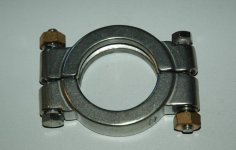FishmanK
Member
Received Sanitary High-Pressure (2-bolt) Clamps
"Dixon" "200"
they are same diameter as a chinese 2" high-pressure clamp but seems frames of these are heavier and the channel of the clamps is narrower than the generic chinese 304 so Im having trouble seating it correctly w PTFE gaskets
Is this the style of Dixon Clamps?
Are they better to use with only viton etc and not thick PTFE?
"Dixon" "200"
they are same diameter as a chinese 2" high-pressure clamp but seems frames of these are heavier and the channel of the clamps is narrower than the generic chinese 304 so Im having trouble seating it correctly w PTFE gaskets
Is this the style of Dixon Clamps?
Are they better to use with only viton etc and not thick PTFE?






